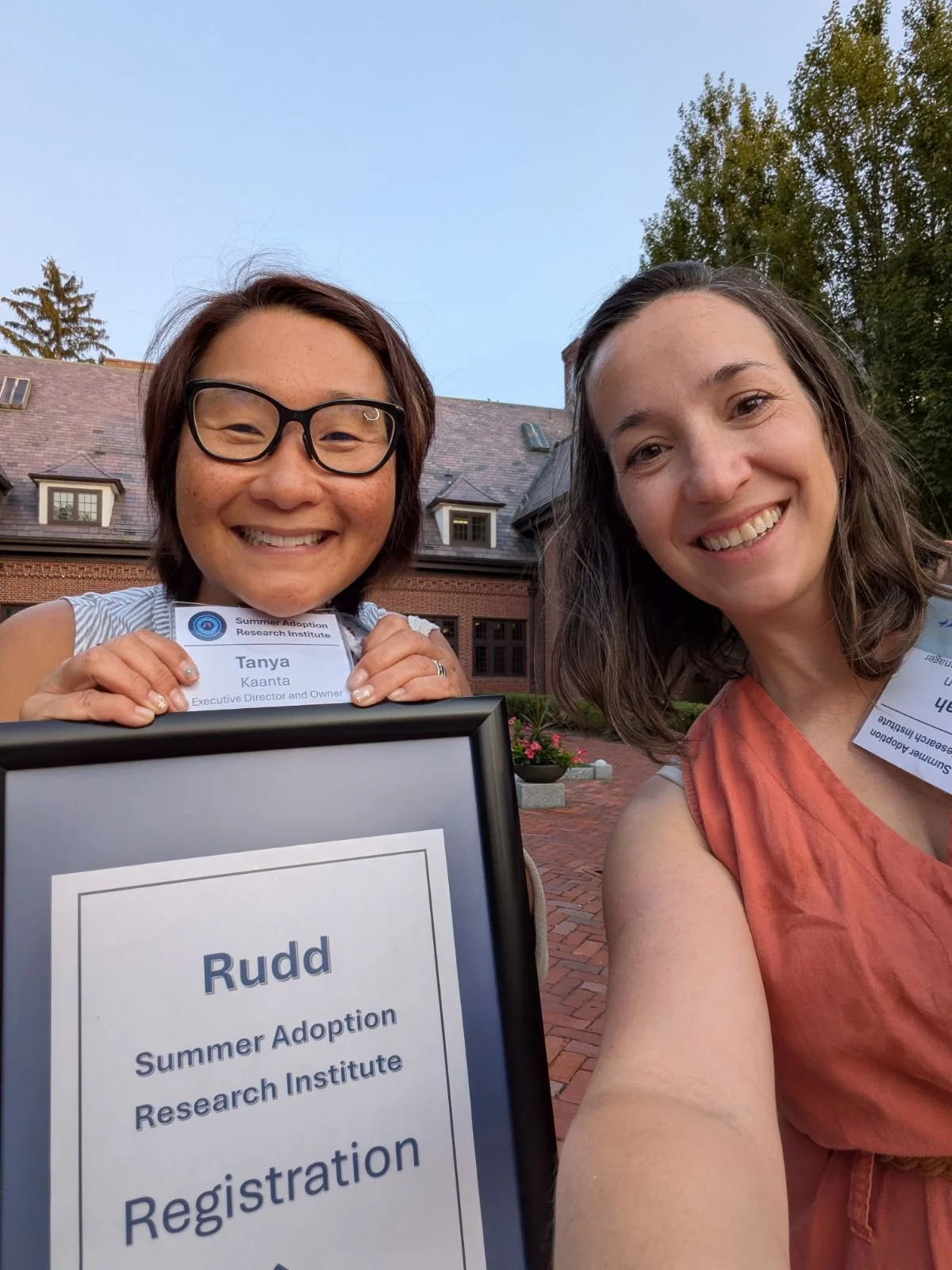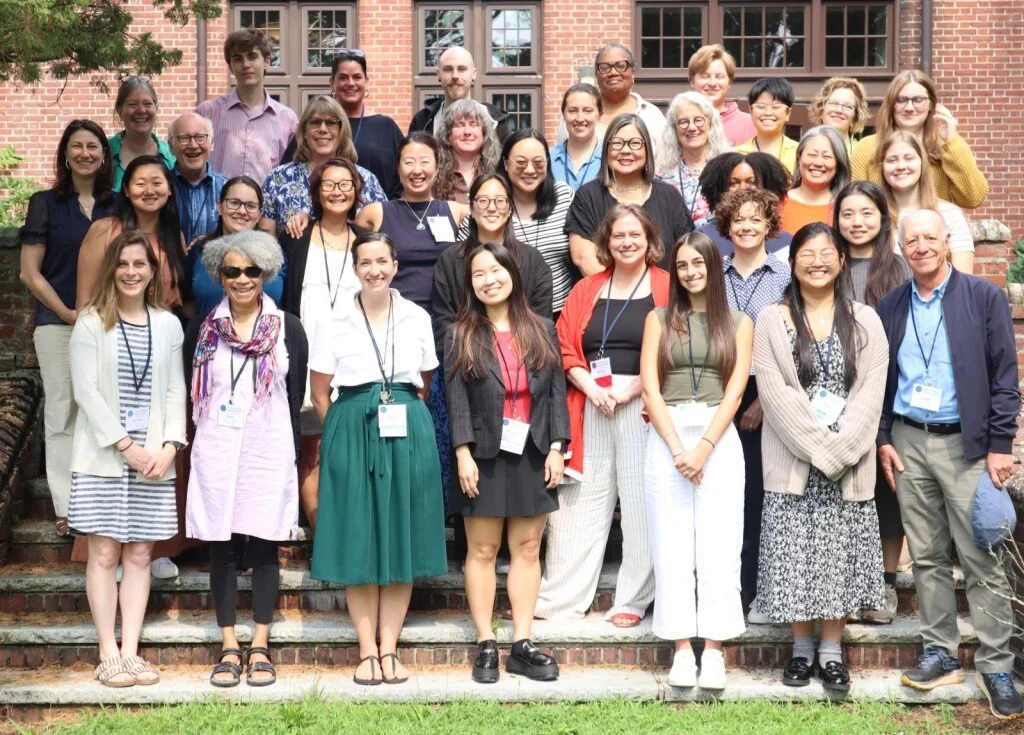Returning to Research: Reflections on the Rudd Institute’s Adoption Masterclass
This is part 1 of a two part series.
By Dr Tanya Kaanta, Owner & Executive Director of The Ties Program
Tanya (left) and Sarah (right), pose for a selfie at Rudd Summer Adoption Research Institute.
I often refer to myself as a "recovering academic" since leaving the ivory tower in the spring of 2017. My departure followed a severe illness with a rare brain disease called Autoimmune encephalomyopathy. Upon my recovery, I chose not to return to academia. My PhD was in Sociology with a focus on Intercountry Adoption Identity Formation, Emotion Work, Advocacy, and Agency. While I had previously concentrated on post-adoption research, my focus had shifted since the early 2000s. My speaking engagements during this time were limited to occasional appearances at heritage camps or guest speaking for academic colleagues.
Therefore, it was with a mix of excitement, anxiety, and trepidation that I found myself a trainee at the 4th annual Summer Adoption Research Institute of the Rudd Adoption Research Program, held at the University of Massachusetts Amherst, Mt. Ida Campus. I was thrilled to be selected, but also extremely nervous, convinced that my almost 15-year hiatus from adoption-related research would make me stand out. However, with the encouragement of Sarah Kurtzahn, Ties Senior Program Manager, I knew this would be a special and highly educational experience.
The Summer Adoption Research Institute is essentially a 5-day masterclass covering all aspects of adoption and foster care. The Institute began with a comprehensive overview of the history, present state, and future direction of research in the field. We delved into topics ranging from trauma to family systems, exploring the impact of early caregiving environments on the development of stress response systems and cortisol levels in children, and considering the potential of parenting-based interventions. We examined research on the scope of child maltreatment, the breadth of prevention efforts, and the obstacles hindering these efforts. We also asked questions about the researcher's positionality and the complexities of unpacking intersectional identities within the adoption constellation like race and adoption (+Pinderhughes, et al, 2021; ++White, et al, 2022). This includes, but is not limited to: race, family, ethnicity, class, and nationality. We questioned how we define these terms, what they mean, and how these meanings interact within the adoption constellation. We also explored microaggressions (^Baden, 2016, 2024) – what they are and how they can inform counseling and training for members of the adoption triad or within the foster care system. The lived experiences of those in the foster care system were also a key area of discussion. These topics represent just a sampling of the issues we discussed: we only began to scratch the surface of the many topics, concerns, needs, and areas that affect our communities.
A group photo of all of the attendees at Rudd Summer Adoption Research Institute. Tanya is 2nd row, third from left. Sarah is first row, third from left.
While I gained a great deal of knowledge, what particularly stood out was the breadth of research being conducted, with a notable trend focusing on the lived experiences of adult adoptees. This involves elevating and centering the perspectives of adult adoptees. We examined the effectiveness (or lack thereof) of interventions and programs designed for children (adoptees and children in foster care) now that they have reached adulthood. The voices of these participants offer invaluable insights that can inform our community. Furthermore, newer models of identity, such as the adoptee consciousness model (**Branco, et al, 2023), are helping us understand the complexities of navigating our understanding of adoption and identity.
This research provides a crucial opportunity to share much-needed information and understanding with our community. It helps us explain where individuals might be on their journeys, illustrating how they are grappling with concepts, processing their past and present, or reconciling previous understandings with current realities or future possibilities. This knowledge creates space for personal understanding and allows those around us to recognize where we might be in our own processes of reconciliation, exploration, and contemplation. It highlights when support or space is needed, and clarifies instances of communication breakdown, where support might have been offered but wasn't what was truly needed, and vice versa.
At Ties, this is an opportunity for us to engage with our community as we navigate new developments, refine our existing strengths, continue to share and apply knowledge, and explore collaborative building with other organizations that support the adoption constellation.
Tanya waves as she walks into the building at Rudd Summer Adoption Research Institute.
Let's continue prioritizing studies that center the adoptee experience, revealing the outcomes of past policies and interventions. We need to understand what worked, what still might work, and how we can continue to provide support by providing programs with actionable resources. Such examples include guiding parents to be color-aware, not color-blind, and fostering open discussions about loss rather than avoidance.
I am truly excited to explore these next steps for Ties. The camaraderie, inspiration, and mentorship I experienced at Rudd continue to fuel my passion for meeting adoptees where they are and supporting them on their journey.
Resources
**Branco, S. F., Kim, J., Newton, G., Cooper-Lewter, S. K., & O'Loughlin, P. (2023). Out of the fog and into consciousness: A model of adoptee awareness. International Body Psychotherapy Journal, 22(1), 53-66
+Pinderhughes, E. E., Matthews, J. A. K., Zhang, X., & Scott, J. C. (2021). Unpacking complexities in ethnic–racial socialization in transracial adoptive families: A process-oriented transactional system. Developmental Psychopathology, 33(2), 493–505
Follow the blog to read part 2 later this month. In the meantime, if you are looking for connection and community, join us on our Community & Connection Wellness Trip in Sedona, Arizona—a retreat-style experience created for international and domestic adoptees and loved ones to pause, reflect, and connect in a supportive space.
If this sounds like the space you’ve been waiting for, spots are limited—check out our trip page to learn more, request info, or register to save your place today.


